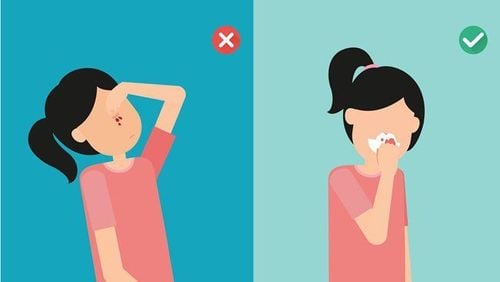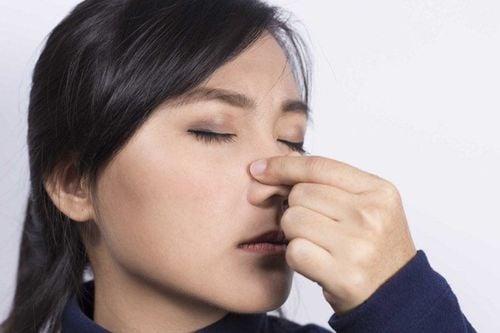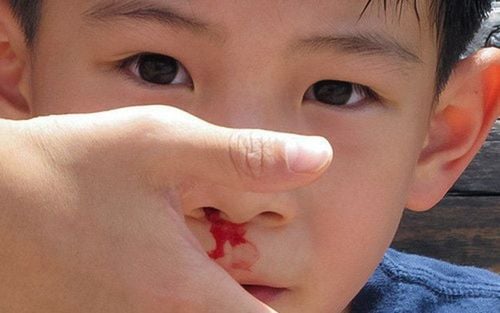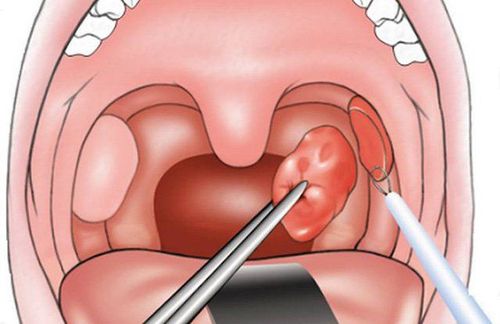This is an automatically translated article.
This article is expertly consulted by MSc Nguyen Huy Nhat - Department of Medical Examination & Internal Medicine - Vinmec International Hospital Da Nang.About 60% of the world's population suffers from nosebleeds once in their life, but not everyone knows the right first aid for nosebleeds. Some mistakes made can make bleeding worse.
1. Causes of nosebleeds
Nosebleeds, also known as nosebleeds, occur when the blood vessels in the nose are damaged. This damage results in blood draining from the inside of the nose. There are many causes of nosebleeds, one of which is:Due to minor injuries (picking the nose, scratching the nose). Strong trauma caused by direct impact to the nose. Diseases caused by blood clotting disorders or high blood pressure. Deviated nasal septum. Inflammation of the respiratory tract. Foreign body: when you see bleeding and pus in one side of the nose, it is necessary to think of a foreign body in the airway. Dry air, low humidity. In some cases, the cause is unknown, the flow is sudden and stops on its own.

2. Mistakes in handling nosebleeds
Tilt your head back when nosebleed When nosebleed, we are often advised to tilt our head back, but this action is completely wrong and can affect health. The act of tilting your head back after a nosebleed will cause the blood to flow back down your throat, where it will run through the stoma and can cause aspiration. The situation may be worse if you swallow the nosebleed part again, when it enters the stomach it will cause symptoms of nausea and vomiting.Absolutely do not use your hands to close the nostrils to prevent bleeding, which causes more blood to flow out as well as a higher risk of backflow into the throat.

However, doctors do not recommend this, because all common materials are not guaranteed to be sterile, especially when it comes into direct contact with the mucous membrane of the nose. If the hemostatic device is not clean, it can cause an infection.
Using too much salt water Many people think that regular physiological saline drops will moisten the nasal mucosa, avoid dry nose, and prevent nosebleeds. However, this concept is not true, instilling saline into the nasal mucosa is not a long-term solution because it only immediately moistens the nose, in the long run it also makes the nose drier. Even the use of humidifiers are just temporary solutions.
Drink enough water, eat a lot of green vegetables, fruits to increase fiber combined with the above support measures will help you and your loved ones avoid unpleasant nosebleeds.
3. How to properly handle a nosebleed
Correct steps to deal with nosebleeds:
Step 1: Calmly find a flat place to sit down. Step 2: Slightly bend your head forward, use your fingers to press down on the part of the nose that is bleeding (if it only flows on one side and fix it for at least 30 seconds). Step 3: Use a clean tissue or cotton ball to absorb the bleeding, absolutely do not put it deep into the nose. Note: If after 10-15 minutes, the bleeding still does not stop, go to the hospital or medical facilities immediately for timely treatment. Once the bleeding has stopped, you can place a small ice pack on your nose to relieve pain and swelling. Absolutely do not pick or blow your nose for several hours after a nosebleed. Avoid irritants such as cigarette smoke until the wound is completely healed.

4. When to see a doctor?
Nosebleeds lasting more than 20 minutes; profuse bleeding. Nosebleeds occur after an injury. Feel or taste blood in your throat even if the bleeding has stopped. Bleeding with symptoms of dizziness, high fever, or vomiting. Nosebleeds occur in children under 2 years of age. Frequent bleeding. Bleeding after taking medicine or in bad health.
Please dial HOTLINE for more information or register for an appointment HERE. Download MyVinmec app to make appointments faster and to manage your bookings easily.
Via: Wikihow













